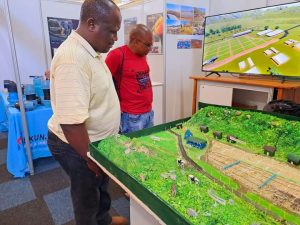By Delisa Thwala
The fourth day of the Eswatini International Trade Fair (EITF) saw a litany of free business seminars take place amid the ongoing exhibitions.
One of the seminars was curated by the Ministry of Agriculture where they discussed how Agriculture can be digitised.
The theme from the Ministry was ‘Transforming Agribusiness through Innovation and Digitization’.
According to the moderators, the seminar said farmers are producing without knowing the market demand for their produce, which leads to food waste or scarcity.
RELATED: EU funds Ministry of Agriculture with E183 million
According to the Ministry of Agriculture team, technology can fix the food system by ensuring that information is shared timeously across the value chain.
“Placing an online order for farming inputs saves Velebantfu Dlamini about E180 in transport fees for a round trip of about 320 kilometres. The 26-year-old vegetable farmer from Nkhungwini in the Shiselweni Region,
south of Eswatini, uses a portal to order from the National Agriculture Marketing Board (NAMBoard) Farm Store. NAMBoard then delivers his order, leaving Dlamini with time to look after his crops,” shared the moderator, making an example of the current situation on the ground.

Another moderator said organising how information is shared so that in a world where the average food item travels many miles to its destination, people, consumers, and producers can make the right decisions.
“We are also consumers, so we decided to bring big data, hardware, and even robotics to help solve the problem of food waste,” said the moderator.
Meanwhile, according to Wikipedia an estimated 1.3 billion tonnes of food is wasted globally each year, which is equivalent to one-third of all food produced for human consumption, according to the Food and Agriculture Organization of the United Nations (FAO).
RELATED: Agriculture budget should be 10% of national budget – MP
Another tech giant, Microsoft, is looking at its company in terms of reducing food waste. It was analysing its operations and supporting other activities related to reducing carbon and ensuring water efficiency, said its director for agribusiness solutions, Darney Debnam.
“Microsoft is also committed to supporting other companies – whether it’s retailers or food services with using Microsoft capabilities or other tech to reduce food waste,” said the moderator.
He said an example would be ensuring a company maintains a longer shelf life for a product using technology.
Speaking at the same event, Andrea Renda, the senior research fellow and head of Global Governance, Regulation, Innovation, and the Digital Economy (GRID), at the Centre for European Policy Studies, warned that technology could be harmful if not used properly.
“All these technologies can be used for good and bad,” said Renda.
“We need to use them carefully and as a means to a more sustainable end because if we don’t use them properly, they can end up exacerbating the problem of sustainability that the current food system has generated over time.”
Renda also said many technologies could be a game changer in the food system. He said incorporating technologies in the whole food supply chain for optimised production and distribution plus using the collaborative economy to reduce food waste could enhance the food system and make it more sustainable